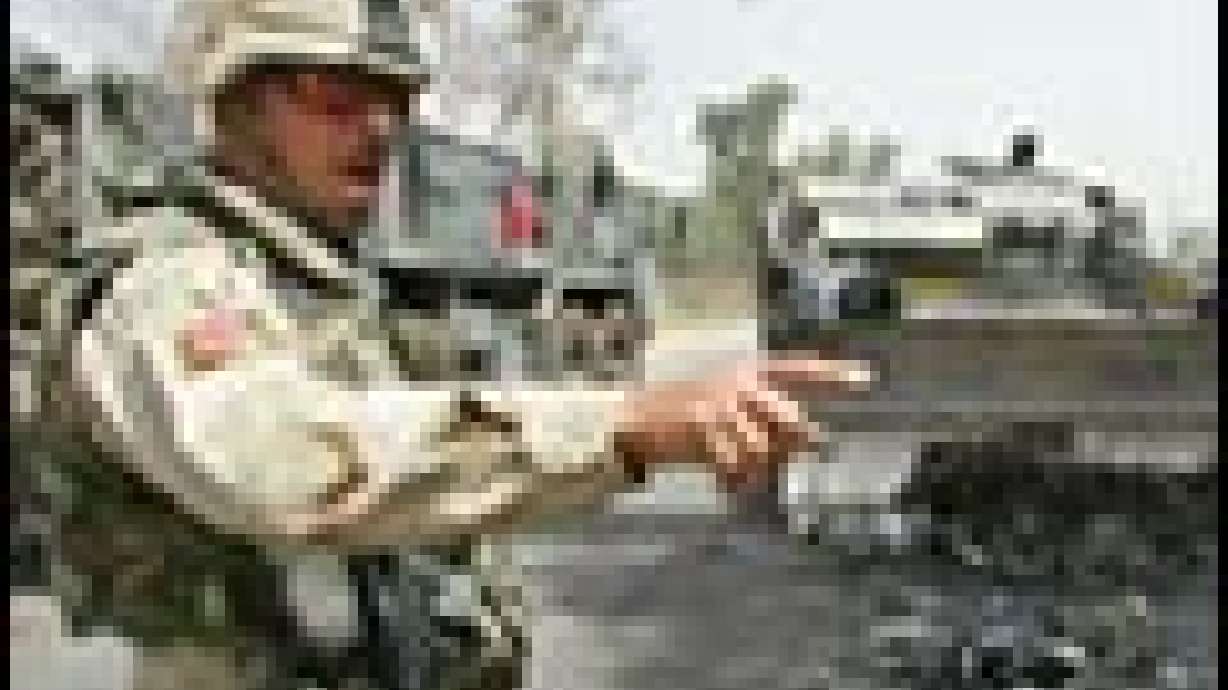Estimated read time: 5-6 minutes
This archived news story is available only for your personal, non-commercial use. Information in the story may be outdated or superseded by additional information. Reading or replaying the story in its archived form does not constitute a republication of the story.
BAGHDAD, Iraq (AP) -- A suicide car-bomber killed a dozen people Sunday near a U.S. garrison in Baghdad and gunmen assassinated a senior Education Ministry official in a day that also included a rocket attack on the Green Zone housing the U.S. administration and ambushes around the capital. A U.S. helicopter crashed but the crew survived.
Two other top Iraqi officials narrowly escaped death in what appears to be a campaign to target key figures in the new Iraqi administration as it prepares to take power June 30.
Elsewhere, an American soldier was killed and two others were wounded Sunday during an ambush near Taji, 12 miles north of Baghdad, the U.S. command said. One assailant was also killed.
A U.S. Army OH-58 helicopter crashed Sunday, also near Taji, but the two-member crew survived "in good condition," the U.S. command said. The command said there was no indication the aircraft was shot down, but the incident was under investigation.
At least six people, including three Shiite militiaman, died in overnight clashes with U.S. troops in Baghdad's Sadr City neighborhood, Sheik Hassan al-Edhari, an aide to radical cleric Muqtada al-Sadr, said Sunday.
The suicide attack near the U.S. Army's Camp Cuervo in eastern Baghdad was the 15th car-bombing in Iraq since the start of the month, U.S. officials said. The 12 dead included four policemen, officials said, but there were no American casualties.
Thirteen Iraqis were injured in the blast, which occurred about 9:15 a.m. after police flagged down a vehicle traveling on the wrong side of the road. The driver detonated the explosives as police approached.
Kamal al-Jarah, 63, the Education Ministry official in charge of contacts with foreign governments and the United Nations, was fatally shot early Sunday outside his home in the city's Ghazaliya district, a predominantly Sunni Muslim neighborhood where support for Saddam Hussein had been strong.
Al-Jarah's death occurred one day after Iraq's deputy foreign minister, Bassam Salih Kubba, was mortally wounded in another Sunni neighborhood while driving to work. The Foreign Ministry blamed Saddam loyalists for the killing.
"These assassinations are an attempt to stop the march of Iraq toward complete sovereignty," Industry Minister Hakim al-Hasni told Al-Arabiya television. "They are not a resistance because they are resisting their own people. They are killing the highly qualified people. What kind of a resistance is this?"
During a visit Sunday to a new crossing point along the Iranian border, interim Prime Minister Iyad Allawi said his Cabinet was "discussing serious and drastic measures once sovereignty is transferred to take against terrorists and those trying to undermine the progress of Iraq." He did not elaborate.
Rather than going after top government figures who are well protected, the insurgents appear to be targeting middle and upper level officials who lack adequate security.
In Washington, Secretary of State Colin Powell said U.S. forces would do "everything we can to "try to defeat these murderers." However, Powell told "Fox News Sunday" that "it's hard to protect an entire government."
Underscoring those difficulties, a rocket exploded Sunday in the Green Zone, causing minor damage to the Republican Palace where U.S. administrator L. Paul Bremer maintains his offices. There were no reports of casualties, but U.S. Apache attack helicopters roamed the skies overhead looking for the assailants.
In addition to the assassinations -- the first against top government officials since the new leadership was appointed June 1 -- two other senior figures escaped death in separate attacks over the weekend.
The chief of Iraq's border police, Maj. Gen. Hussein Mustafa Abdul-Kareem, was slightly wounded Saturday in a shooting in Baghdad.
Police Maj. Gen. Majeed Almani Mahal was hospitalized with wounds received Saturday in an ambush in Baqouba, 40 miles northeast of Baghdad, officials said.
In Kirkuk, an ethically mixed northern oil center, gunmen killed a locally prominent Kurdish cleric, Iyad Khorshid, late Saturday, Police said. The preacher had spoken out recently against attacks on Iraqi infrastructure, police and civilians.
A former Baath party official, Rajaa Mohammed Ali, was gunned down Sunday near her home in Baqouba, police reported. Also, two employees of the U.S.-funded Iraqi television network were found dead near the Syrian border. The cause of death was not known.
Also Sunday, a car bomb exploded Sunday near a civilian convoy escorted by U.S. troops near Iskandariyah, 25 miles south of Baghdad. There were no U.S. casualties but one Iraqi civilian was hurt, U.S. officials said.
In Kirkuk, overnight clashes between police and gunmen left two people dead and 11 people injured, six of them police, officials said.
American authorities had feared an escalation of violence in the run-up to the June 30 handover of sovereignty as insurgents seek to derail the process or discredit the new government.
The Americans hope that establishment of a sovereign Iraqi government will drain support for the insurgency, allowing security to improve so that balloting for an elected administration can be held by the end of January.
But militants -- both Saddam loyalists and those with radical Islamic motivation -- have long considered Iraqis who cooperate with the American-run occupation to be collaborators. Although the new government i s supposed to become sovereign, its top figures were all appointed in a process in which the American occupation authorities played a major role in the selections. Iraqis will not have an elected government until a national ballot planned by the end of January.
About 150,000 U.S. and other coalition troops will remain in the country to help improve security after June 30 under a U.N. resolution approved unanimously by the U.N. Security Council on Tuesday.
(Copyright 2004 by The Associated Press. All Rights Reserved.)








